大学英语语法精讲与练习.doc
2025高考英语步步高大一轮复习讲义人教版必修第二册——选择性必修第四册语法专题答案精析
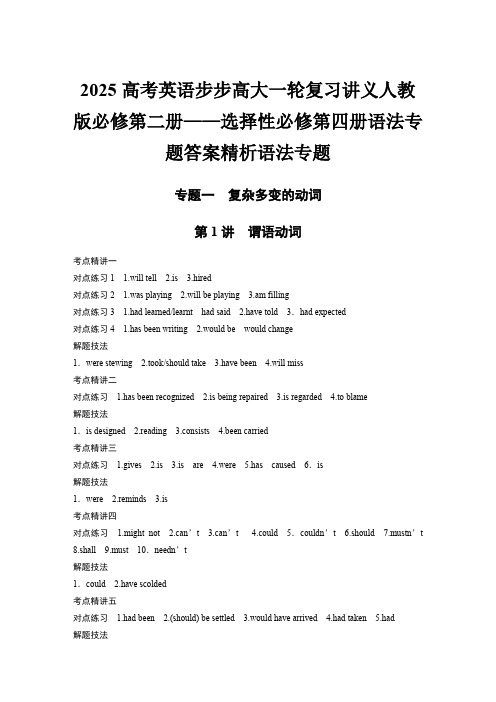
2025高考英语步步高大一轮复习讲义人教版必修第二册——选择性必修第四册语法专题答案精析语法专题专题一复杂多变的动词第1讲谓语动词考点精讲一对点练习1 1.will tell 2.is 3.hired对点练习2 1.was playing 2.will be playing 3.am filling对点练习3 1.had learned/learnt had said 2.have told3.had expected对点练习4 1.has been writing 2.would be would change解题技法1.were stewing 2.took/should take 3.have been 4.will miss考点精讲二对点练习 1.has been recognized 2.is being repaired 3.is regarded 4.to blame解题技法1.is designed 2.reading 3.consists 4.been carried考点精讲三对点练习 1.gives 2.is 3.is are 4.were 5.has caused6.is解题技法1.were 2.reminds 3.is考点精讲四对点练习 1.might not 2.can’t 3.can’t 4.could5.couldn’t 6.should7.mustn’t 8.shall9.must10.needn’t解题技法1.could 2.have scolded考点精讲五对点练习 1.had been 2.(should) be settled 3.would have arrived 4.had taken 5.had解题技法1.wouldn’t be 2.would stop 3.(should) get 4.focused考点分层演练层级一1.was working 2.have kept 3.had sunk 4.have been made5.was brought 6.is being taken 7.will be distributed8.is designed9.was listed10.have become层级二1.be employed 2.means 3.have promised 4.was fixing 5.threw 6.was built7.connects 8.had been offered9.will deliver/will be delivering10.are being displayed层级三Passage 11.was established 2.built 3.consisted 4.were replaced 5.(were) kept 6.understood7.have tried/have been trying8.to save9.(are) watched10.are playingPassage 21.needn’t 2.danced 3.can 4.did/should do 5.will6.(should) not allow7.must 8.didn’t wear9.shall10.should语法链接写作1.Though I felt a little sorry that you left China last year,I am pleased to know you are leading a happy life in your hometown.2.If you are available next Sunday,I will wait for you at the school gate and I’m sure we will have a good time together.3.It can easily be seen that the percentage of students who choose listening to English songs and watching English movies is respectively 65% and 50%.4.(1)If I hadn’t read the newspaper Youth,I wouldn’t have made such great progress in English.(2)In a word,it is high time that we should raise/raised our awareness of environmental protection.(3)It is required that anyone who wants to participate should arrive at the lecture hall on time to watch the movie and take part in the discussion.(4)But for/Without her help and professional instruction,I couldn’t have made such great progress in English study.5.From the learning experience,I fully understand that only by practicing a lot can we overcome many kinds of difficulties.第2讲非谓语动词考点精讲一对点练习 1.to have 2.carried 3.having completed 4.to have been robbed 5.being settled考点精讲二对点练习 1.to walk cated 3.forming 4.thinking5.getting 6.encouraging考点精讲三对点练习 1.being discussed 2.to support 3.marked4.living考点精讲四对点练习 1.making 2.to teach 3.permitting pleted 5.absorbed考点精讲五对点练习 1.smoking 2.delivered 3.to process解题策略1.Knowing 2.Being offered 3.to have received 4.Having been shown 5.making考点分层演练层级一1.being charged 2.applied 3.desiring 4.to be cheered5.Having suffered 6.absorbed 7.associated8.to master9.driven10.putting层级二1.borrowing intended 2.built 3.Having visited recording4.to continue 5.to journey 6.held 7.planning8.To strengthen inviting9. Covering10.to see层级三1.Going 2.are 3.refreshed 4.amazing 5.gets 6.astonished7.wondering8.to put 9.aching10.to visit语法链接写作1.Persuading him into accepting my views was impossible,so I didn’t want to waste my time discussing.2.(1)Hearing of the unexpected news,she was so surprised that she froze with her mouth wide open.(2)Worn out,David reached the finishing line and all the students cheered for him.3.To learn English more efficiently,you had better choose the Listening and Speaking course. 4.Having sold out all the popcorn,they decided to call it a day and go home.专题二需要变形的名词、数词、形容词和副词第1讲名词考点精讲一对点练习 1.championships 2.activities 3.weaknesses4.passersby 5.heroes 6.barber’s 考点精讲二对点练习 1.Word word 2.experiences experience 3.a/考点精讲三对点练习 1.arrival 2.invitation 3.responsibility 4.marriage 5.accuracy解题策略1.requirement professions 2.pollution 3.conditions4.dishes第2讲数词对点练习 1.thirteenth 2.thirds 3.ninth 4.twenties5.thousands解题技法1.second 2.has been polluted 3.fifth第3讲形容词和副词考点精讲一对点练习 1.personal 2.disappointed 3.amazing 4.hungry 5.highly 6.officially 7.Luckily8.terribly考点精讲二对点练习 1.more 2.wider 3.biggest 4.faster 5.as/so解题策略1.smaller 2.tasty 3.finest 4.gently考点分层演练层级一1.carrots 2.achievement 3.intention 4.fifties 5.twelfth6.third7.industrial8.surprising rgest10.widely层级二1.sixth 2.Different 3.warning 4.remarkable 5.rarely6.visiting7.interviews 8.Basically9.photographer10.meaningful层级三1.dynastic 2.classes 3.originally 4.closer 5.wealthy6.beautifully7.spacious 8.simpler/more simple9.cultural10.events语法链接写作1.When it comes to ocean,it’s of great importance to the world;however,its pollution isbecoming more and more serious.2.Last weekend,I participated in a “Getting to Know the Plants Around Us” activity organised by our Student Council with curiosity.3.(1)As you know,the more people are involved,the better the ocean environment is.(2)Nothing is more important than my teacher’s encouragement.Without it,I couldn’t have won the prize.专题三不可忽视的小词第1讲冠词考点精讲一对点练习 1.a 2.an 3.a 4.a考点精讲二对点练习 1.the 2.the 3.the 4.The 5.The考点精讲三解题策略1.a 2.the第2讲代词考点精讲一对点练习 1.himself 2.our 4.it 5.it 6.It考点精讲二对点练习 1.other 2.another 3.none 4.neither 5.one解题策略1.mine 2.their 3.herself 4.it第3讲介词对点练习 1.on 2.with 3.by 4.in 5.for 6.on解题技法1.by 2.for 3.in考点分层演练层级一1.an 2.the 3.the 4.his 5.them 6.myself7.it8.their9.on10.like层级二1.the 2.as 3.to 4.by 5.a 6.the7.by8.its9.the10.neither层级三1.a 2.their 3.of 4.for 5.with 6.a7.them8.her9.the10.by语法链接写作1.Because I am attracted by the contents,reading Youth becomes a must for me every day.2.It was exciting to learn that I had gained first prize and an award ceremony would be held in three days.3.Although online learning makes it easier for people to gain knowledge,being online is also a challenge for people who lack selfdiscipline.4.Eventually,because of my persistence and painstaking efforts,I could skate freely all by myself.专题四三大从句与特殊句式第1讲定语从句考点精讲一对点练习 1.which/that 2.whose 3.is 4.As 5.that6.which考点精讲二对点练习 1.when 2.where 3.which 4.why考点精讲三对点练习 1.which 2.whom 3.them 4.which解题策略1.which/that 2.where 3.who/that 4.whose 5.As考点分层演练层级一1.which 2.where 3.who 4.where 5.who/that 6.when7.whose8.As9.why 10.whom层级二1.which/that 2.where 3.who/that 4.who 5.that6.that 7.where8.whose9.which/that 10.where层级三1.when 2.why 3.where 4.whose 5.whom 6.that/which7.who8.which9.which 10.As语法链接写作1.运用1Confucius,also known as Kong Qiu,was a Chinese philosopher and politician who lived during the Spring and Autumn Period.运用2World Ocean Day which/that falls on June 8th is aimed at raising people’s awareness of ocean conservation.2.First,you’ll be shown around our school and have lunch at a local restaurant,where you can have a taste of authentic Chinese food.3.For students,what is most beneficial to their study is reading English books,from which they can learn what they can’t in class.4.To begin with,I suggest organizing a walking tour around the city to explore the green spaces in Beijing,which will allow participants to experience the beauty of the city’s parks.第2讲名词性从句对点练习 1.why 2.what 3.how 4.that 5.that6.whether解题技法1.What 2.how 3.whoever 4.where 5.whether/if考点分层演练层级一1.whether 2.why 3.how 4.what/whatever 5.where6.that7.What8.when9.who 10.because层级二1.why 2.whether/if 3.how 4.where 5.what 6.why/that7.what8.whether/if9.what 10.that层级三1.What 2.that 3.whether 4.why 5.How 6.who7.that8.that9.when10.because语法链接写作1.What surprised me was that my dad allowed me to use the money as I wished.2.No one can deny the fact that online learning is becoming more and more popular.3.I’m sorry that I can’t go out with you as planned.The reason is that my younger brother broke his leg the other day and I must look after him.4.The exhibition is fantastic and shows the charm of Chinese culture.This is why I would like to recommend my fellow students to attend this art show as well.5.I recommend that you (should) choose the Listening and Speaking course,because the course is entirely taught in Chinese,which will benefit you a lot.第3讲并列句和状语从句考点精讲一对点练习 1.while 2.when 3.or 4.but/yet 5.so考点精讲二对点练习 1.until 2.before 3.than 4.before 5.since考点精讲三对点练习 1.if 2.Wherever 3.as/though 4.that 5.because/as 6.that7.though/if8.how 解题策略1.and 2.While 3.because 4.before考点分层演练层级一1.that 2.because/as 3.but 4.and 5.when 6.while7.if8.though/although9.until/till 10.whatever层级二1.and 2.but/yet 3.or 4.because 5.whether 6.until/till7.or8.When/As9.if/though 10.unless层级三1.who/that 2.than 3.visiting 4.when 5.While/Though/Although 6.but7.higher8.If 9.for10.but语法链接写作1.Not only does the ocean offer us sufficient food,but it also maintains the balance of nature. 2.Come to the exhibition,and you will enjoy a visual feast.3.So difficult and painful for me was writing that my teacher had allowed me to present my paper on the sinking of the Titanic by acting out a play,where I played all the parts.4.We were looking for a place to put up the tent when Mother told us that she had forgotten to take it.5.Not until yesterday was I informed that our class was going to hold an important meeting this weekend—exactly the time when we shall meet.第4讲特殊句式考点精讲一对点练习 1.and 2.What 3.that考点精讲二对点练习 1.live 2.as/though 3.did 4.are 5.did考点精讲三对点练习 1.expected 2.writing 3.dealt 4.to make解题策略1.are 2.that考点分层演练层级一1.that 2.Sitting 3.warned 4.were 5.that 6.If层级二1.that 2.Were 3.that 4.did 5.came层级三1.a 2.that 3.without 4.continuing 5.permission6.logical7.were said8.further 9.Inspired10.whose语法链接写作1.What a fantastic Chinese painting show it is!2.“Hurry up,or the bear will catch up with us,” said Elli.3.It was at that festival that you shared so many interesting things about your country.4.Only when all the people make their efforts to protect the ocean will the ocean environment become better and better.5.So happy was Bernard that he gave John a big hug.6.In the backyard were two happy dogs tumbling about on the grassland.。
语法专攻高考英语一轮精讲精练英语句子结构和成分分析含详解 (1)

简单句的五种基本结构正确的英语句子都要符合一定的语法结构要求。
英语句子的结构可以归纳成五种基本句型。
英语句子都可以看作是这五种句型及其扩大、组合、省略或倒装构成的。
掌握这五种基本句型,是掌握各种英语句子结构的基础,也是学好其他语法知识的前提。
英语五种基本句型结构如下:用符号表示为:①SV(主+谓)②SVO(主+谓+宾)③SVoO(主+谓+间宾+直宾)④SVOC(主+谓+宾+宾补)⑤SVP(主+系+表)主语(subject)谓语(predicate)宾语(object)定语(attribute)状语(adverbial) 补语(complement)表语(predicative)考点1. 基本句型一:SV(主+谓)这类句子的谓语动词都是不及物动词,都不带宾语,但可以带状语。
如:Itisrainingnow.(SV)We’veworked for5hours.(SV) Themeetinglastedhalfanhour.(SV)Timeflies.(SV)练习1. 分析下列句子成分,并在后面括号内标明属于五种基本句型中的哪一种。
1.Darkcloudshungoverhead.()2.Graduallyasmileappearedonherface.()3.Heissmilingalloverhisface.()4.IdidwellinEnglish.()5.Hetalkedloudlyintheclassroomyesterday.()考点2. 基本句型三:SVO(主+谓+宾)此结构是由“主语+及物动词(词组)+宾语”构成。
ShelikesEnglish. Weplantedalotoftreesonthefarmye sterday.练习2. 分析下列句子成分,并在后面括号内标明属于五种基本句型中的哪一种。
1.PeopleallovertheworldspeakEnglish.2.Jimcannotdresshimself.3.AllofusbelievethatJackisanhonestboy.4.Hedidnotknowwhattosay.5.Hejustwantedtostayathome.6.HepracticesspeakingEnglisheveryday.考点3. 基本句型四:SVoO(主+谓+间宾+直宾)有些及物动词可以有两个宾语,如:give“给”,pass“递”,bring“带”,show“展示”。
高考英语语法词汇专项突破:形容词、副词比较级要点精讲+巩固训练(含高考真题)

高考英语语法词汇专项突破:形容词、副词比较级要点精讲+巩固训练养成良好的答题习惯,是决定高考英语成败的决定性因素之一。
做题前,要认真阅读题目要求、题干和选项,并对答案内容作出合理预测;答题时,切忌跟着感觉走,最好按照题目序号来做,不会的或存在疑问的,要做好标记,要善于发现,找到题目的题眼所在,规范答题,书写工整;答题完毕时,要认真检查,查漏补缺,纠正错误。
总之,在最后的复习阶段,学生们不要加大练习量。
在这个时候,学生要尽快找到适合自己的答题方式,最重要的是以平常心去面对考试。
英语最后的复习要树立信心,考试的时候遇到难题要想“别人也难”,遇到容易的则要想“细心审题”。
越到最后,考生越要回归基础,单词最好再梳理一遍,这样有利于提高阅读理解的效率。
另附高考复习方法和考前30天冲刺复习方法。
【考点导航】1. ---- Did you enjoy yourself at the party?--- Yes. I’ve never been to _____ one before.(四川XXXX.27)A. a more excitedB. the most excited *C. a more excitingD. the more exciting2. The more I think about him, the more reason I find for loving him _____ I did. (湖南XXXX.31)*A. as much as B. as long as C. as soon as D. as far as3. This washing machine is environmentally friendly because it used _____ water and electricity than _____models.(北京XXXX.21)*A. less; older B. less; elder C. fewer; older D. fewer; elder4.What a table! I’ve never seen such a thing before. It is _____ it is long.(湖北XXXX.28)A. half not as wide asB. wide not as half as*C. not half as wide as D. as wide as not half解析:1.选C。
高考英语语法专题精讲精练-名词性从句

语法专题二:名词性从句1. 名词性从句的基本概念:1) 主语从句:在句中充当主语;亦可用it作形式主语,主语从句置于句末。
2) 宾语从句:在句中充当及物动词或介词的宾语;亦可用it作形式宾语,宾语从句置于句末。
3) 表语从句:在句中充当系动词的表语。
4) 同位语从句:常置于fact, idea, news, promise, doubt, suggestion, possibility, belief等表示有内容的名词后,起解释、说明作用。
2. 注意:1) 名词性从句要用陈述句语序。
2) 名词性从句中缺少主语、表语、宾语时:常用what 导,亦可用which表示选择,用who/whom/whoever指人。
缺少状语:用where(表地点), when(表时间), how(表方式), why(表原因)。
3) 如不缺成份:主语从句、同位语从句用that引导,不能省略;表从、单个动词宾从可省略引导词that;介词宾从、第二个宾从,引导词that一般不省略;it作形式主语或宾语时,引导实际主从或宾从,一般that不省略;当主从、宾从本身为复合句时,引导词that不省略。
如:He told us sadly that what he had done secretly was dis covered by his parents.4) 含宾从的复合句中,主句和从句的时态保持一致,但如果从句中表示是客观现象,虽然主句是过去时态,从句仍用一般现在时。
5) 主语从句做主语,谓语动词用单数;如果由and 连接两个或两个以上的主语从句做主语时,谓语动词用复数;由两个或多个连接词引导一个主语从句,谓语动词用单数。
6) 当主句是I/We think(或suppose, expect, believe, imagine, guess)时,其后的宾语从句如果是否定的,常常把否定词not从从句中移到主句中。
7) 只能用whether,不能用if表示“是否”的情况如下:(1) 在表语从句和同位语从句中;(2) 在主语从句中,如果用it做形式主语,whether和if都能引导主语从句,否则,只能用whether(3) 在介词之后;(4) 后面直接跟动词不定式;(5) 与or not连用;(6) 引导让步状语从句,只能用whether。
英语语法速成一般现在时精讲精练

英语语法速成一般现在时精讲精练一般现在时是英语中最基本的时态之一,用来表示经常性的、重复性的动作,或者客观事实和普遍真理。
在本篇文章中,我们将详细介绍一般现在时的用法,并提供一些相关的练习。
一、第一人称单数和第三人称单数谓语动词的构成在一般现在时中,第一人称单数(I)和第三人称单数(he/she/it)的谓语动词构成方式有所不同。
1. 对于第一人称单数,即I,谓语动词直接采用原形,不需要做任何改变。
例如:I play tennis every Sunday.(我每个星期天打网球。
)2. 对于第三人称单数,即he/she/it,谓语动词在后面加上-s或-es。
具体的变化规则如下:a. 一般情况下,在谓语动词后面加上-s。
例如:She studies English every day.(她每天学英语。
)b. 如果谓语动词以字母s、x、o、ch、sh结尾,那么在后面加上-es。
例如:He watches movies on weekends.(他周末看电影。
)c. 如果谓语动词以辅音字母+y结尾,那么将y改为i,再加上-es。
例如:My dog barks loudly at night.(我的狗晚上叫得很大声。
)二、一般现在时的用法1.表示经常性或习惯性的动作:I often go jogging in the morning.(我经常早上慢跑。
)2.表示客观事实和普遍真理:The sun rises in the east.(太阳从东方升起。
)3.表示现状、感觉或状态:I feel tired after work.(工作后我感到疲劳。
)4.表示固定时间表中的动作:The train always arrives on time.(火车总是准时到达。
)三、一般现在时的练习现在我们来进行一些练习,以巩固对一般现在时的理解。
1. 填入适当的动词形式(第三人称单数):a. He __________ (watch) TV every day.b. The cat __________ (meow) at night.c. Mary __________ (teach) English at a school.d. The sun __________ (shine) in the sky.2. 根据括号中的提示,改写句子:a. She drinks milk every morning.(改为否定句)She ________ ________ milk every morning.b. They play basketball in the park.(改为疑问句)________ they ________ basketball in the park?c. My brother goes swimming on weekends.(改为一般疑问句)________ your brother ________ swimming on weekends?d. We have English class on Monday.(改为否定句)We ________ ________ English class on Monday.(答案)1. a. watches b. meows c. teaches d. shines2. a. doesn't drink b. Do; play c. Does; go d. don't have通过以上练习,希望能够帮助你更好地理解和使用一般现在时。
英语语法精讲精练与专项练习

1. 中文名与英文名:【中文名】由两部分组成-----姓和名,如:Wang Lili一 ,Sun Wukong. 中文名用汉语拼音写成,姓和名要分开写,开头字母都大写。
英文名与中文名顺序恰好相反,名字在前,姓在后。
如:Jim Alan GreenFirst name Middle name Last name︸ | |Given name(教名) Family name(姓氏)【英文名】一般由三部分组成:首名(first name)、中名(middle name)和尾名(last name),其中first name 和middle name是后起的名字,也叫given name(教名)。
Last name 是家族沿用的名字,也叫family name.【巧学妙记】先姓后名中文名,汉语拼音直写成,姓和名要分开写,开头大写才能行。
英文名,大不同,前面名字后面姓,首名称呼最常用,若要表示受尊重,Mr.Mrs.Miss.Ms.姓前用[专项演练]()1.My full name is Jerry Harry Potter. My first name is_and my family name is_.A .Jerry HarryB .Jerry PotterC .Potter Jerry ()2.I’m Tom Green. You can call (称呼) me_A. Mr. TomB. Mr. GreenC. Green2.物主代词:在英语中,表示“你的,我的,他的,她的,它的,你们的,我们的,他们的”等意义的代词形式就叫物主代词。
物主代词是代词的所有格形式,用来表示物品的归属关系,即某物归某人所有。
【主格代词】在句中主要作主语,一般放在句首,说明是谁的情况。
I am a student.我是一名学生。
She is my sister.她是我的妹妹。
He is in China now.他现在在中国。
3.成都专升本语法精讲加练习“It”作形式主语和形式宾语的用法详解
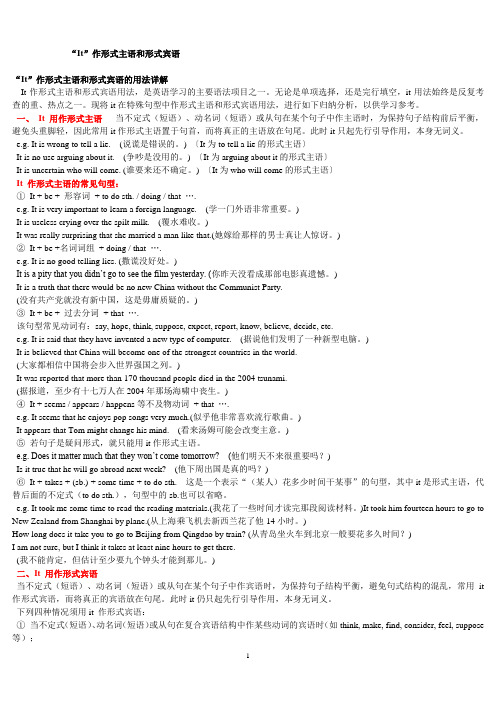
“It”作形式主语和形式宾语“It”作形式主语和形式宾语的用法详解It作形式主语和形式宾语用法,是英语学习的主要语法项目之一。
无论是单项选择,还是完行填空,it用法始终是反复考查的重、热点之一。
现将it在特殊句型中作形式主语和形式宾语用法,进行如下归纳分析,以供学习参考。
一、It 用作形式主语当不定式(短语)、动名词(短语)或从句在某个句子中作主语时,为保持句子结构前后平衡,避免头重脚轻,因此常用it作形式主语置于句首,而将真正的主语放在句尾。
此时it只起先行引导作用,本身无词义。
e.g. It is wrong to tell a lie. (说谎是错误的。
) 〔It为to tell a lie的形式主语〕It is no use arguing about it. (争吵是没用的。
) 〔It为arguing about it的形式主语〕It is uncertain who will come. (谁要来还不确定。
) 〔It为who will come的形式主语〕It 作形式主语的常见句型:①It + be + 形容词+ to do sth. / doing / that ….e.g. It is very important to learn a foreign language. (学一门外语非常重要。
)It is useless crying over the spilt milk. (覆水难收。
)It was really surprising that she married a man like that.(她嫁给那样的男士真让人惊讶。
)②It + be +名词词组+ doing / that ….e.g. It is no good telling lies. (撒谎没好处。
)It is a pity that you didn’t go to see the film yesterday. (你昨天没看成那部电影真遗憾。
剑桥pet语法精讲精练
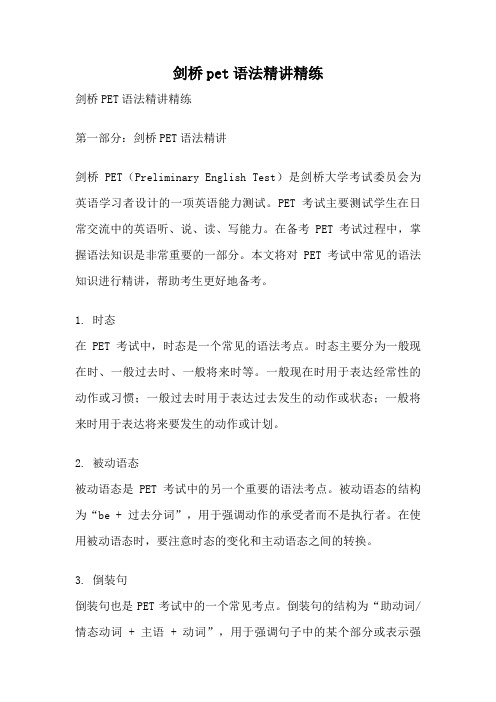
剑桥pet语法精讲精练剑桥PET语法精讲精练第一部分:剑桥PET语法精讲剑桥PET(Preliminary English Test)是剑桥大学考试委员会为英语学习者设计的一项英语能力测试。
PET考试主要测试学生在日常交流中的英语听、说、读、写能力。
在备考PET考试过程中,掌握语法知识是非常重要的一部分。
本文将对PET考试中常见的语法知识进行精讲,帮助考生更好地备考。
1. 时态在PET考试中,时态是一个常见的语法考点。
时态主要分为一般现在时、一般过去时、一般将来时等。
一般现在时用于表达经常性的动作或习惯;一般过去时用于表达过去发生的动作或状态;一般将来时用于表达将来要发生的动作或计划。
2. 被动语态被动语态是PET考试中的另一个重要的语法考点。
被动语态的结构为“be + 过去分词”,用于强调动作的承受者而不是执行者。
在使用被动语态时,要注意时态的变化和主动语态之间的转换。
3. 倒装句倒装句也是PET考试中的一个常见考点。
倒装句的结构为“助动词/情态动词 + 主语 + 动词”,用于强调句子中的某个部分或表示强烈的感情色彩。
在使用倒装句时,要注意主谓一致和疑问句的转换。
4. 定冠词和不定冠词定冠词和不定冠词在PET考试中也是常见的考点。
定冠词“the”用于特指某个事物;不定冠词“a/an”用于泛指某个事物。
在使用定冠词和不定冠词时,要注意单数和复数形式的变化。
第二部分:剑桥PET语法精练在进行PET考试的语法练习时,我们需要通过大量的习题来加深对语法知识的理解和掌握。
下面是一些PET语法练习题,供考生进行练习。
1. 完成句子a) I ______ my homework yesterday. (do)b) He _______ to the park every Sunday. (go)c) The letter ________ by Tom. (write)2. 改写句子a) He opened the door. (改为被动语态)b) They are playing football. (改为一般过去时)c) Never have I seen such a beautiful sunset. (改为陈述句)3. 按要求完成句子a) She has a dog. (改为否定句)b) Did you go to the party? (作否定回答)c) How often do you go swimming? (作肯定回答)第三部分:总结通过对剑桥PET语法的精讲和精练,我们可以更好地掌握PET考试中的语法知识。
大学英语语法精讲与练习
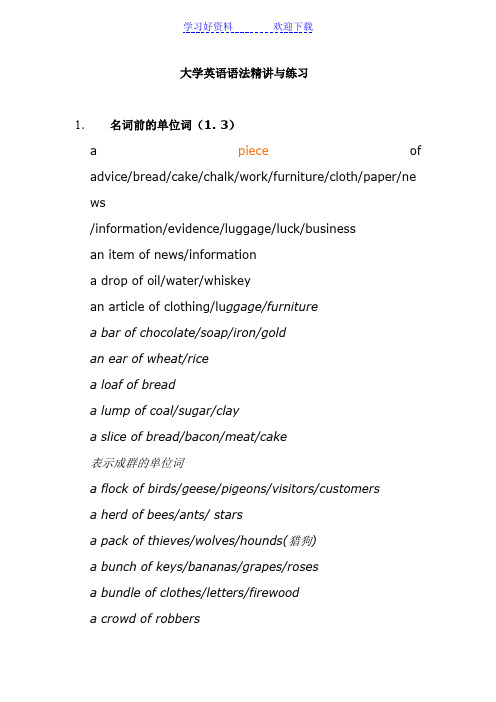
大学英语语法精讲与练习1.名词前的单位词(1. 3)a piece ofadvice/bread/cake/chalk/work/furniture/cloth/paper/ne ws/information/evidence/luggage/luck/businessan item of news/informationa drop of oil/water/whiskeyan article of clothing/lu ggage/furniturea bar of chocolate/soap/iron/goldan ear of wheat/ricea loaf of breada lump of coal/sugar/claya slice of bread/bacon/meat/cake表示成群的单位词a flock of birds/geese/pigeons/visitors/customersa herd of bees/ants/ starsa pack of thieves/wolves/hounds(猎狗)a bunch of keys/bananas/grapes/rosesa bundle of clothes/letters/firewooda crowd of robbers2. 主语与谓语的一致主语与谓语一致的原则:1)语法一致2)概念一致:谓语动词的单、复数形式取决于主语所表达的概念,而不取决于表面的语法标志。
The crowd were fighting for their lives.Three years in a strange land seems like a long time. 3)就近原则Here is a dictionary and a few books.Only one out of five were present.符合语法一致的几种情况(4)1)当主语为单数,虽后续with, along with, together with, as well as, as much as, no less than, more than, like, besides, but, except, in addition to引导的短语,谓语用单数。
英语语法精讲:强调句型it练习题
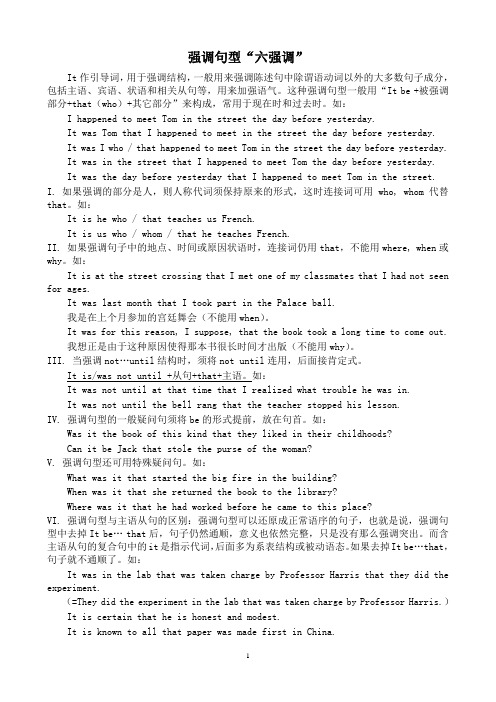
强调句型“六强调”It作引导词,用于强调结构,一般用来强调陈述句中除谓语动词以外的大多数句子成分,包括主语、宾语、状语和相关从句等,用来加强语气。
这种强调句型一般用“It be +被强调部分+that(who)+其它部分”来构成,常用于现在时和过去时。
如:I happened to meet Tom in the street the day before yesterday.It was Tom that I happened to meet in the street the day before yesterday.It was I who / that happened to meet Tom in the street the day before yesterday. It was in the street that I happened to meet Tom the day before yesterday.It was the day before yesterday that I happened to meet Tom in the street. I. 如果强调的部分是人,则人称代词须保持原来的形式,这时连接词可用who, whom代替that。
如:It is he who / that teaches us French.It is us who / whom / that he teaches French.II. 如果强调句子中的地点、时间或原因状语时,连接词仍用that,不能用where, when或why。
如:It is at the street crossing that I met one of my classmates that I had not seen for ages.It was last month that I took part in the Palace ball.我是在上个月参加的宫廷舞会(不能用when)。
英语a级资料

英语a级资料
1. 《大学英语 A 级词汇》:这本书涵盖了英语 A 级考试所需的基础词汇,包括单词的释义、例句、常用搭配等,有助于考生扩大词汇量。
2. 《英语 A 级语法要点精讲与练习》:本书系统地介绍了英语 A 级考试中涉及的语法知识点,通过实例和练习帮助考生加深理解和掌握。
3. 《大学英语 A 级全真模拟试题及解析》:收集了多套英语 A 级考试的模拟试题,附有详细的解析和答案,帮助考生了解考试题型和难度,提高应试能力。
4. 《英语 A 级听力专项训练》:专门针对英语 A 级考试的听力部分,提供了多样化的听力练习材料和题目,帮助考生提高听力理解能力。
5. 《英语 A 级写作指南与范例》:讲解了英语 A 级考试中常见的写作题型和要求,提供了大量的范文和写作技巧,有助于提高考生的写作水平。
6. 在线英语学习平台:利用各种在线英语学习平台,如 Duolingo、BBC Learning English、Edx 等,可以进行听力、阅读、语法等方面的练习。
7. 英语学习 APP:下载英语学习 APP,如 Rosetta Stone、Memrise、Hello English 等,随时随地进行词汇学习、听力训练和口语练习。
以上是一些英语 A 级考试的资料推荐,考生可以根据自己的需求和实际情况选择适合自己的资料进行学习。
同时,坚持练习和积累是提高英语水平的关键。
祝你考试顺利!。
英语划分句子成分精讲和练习题
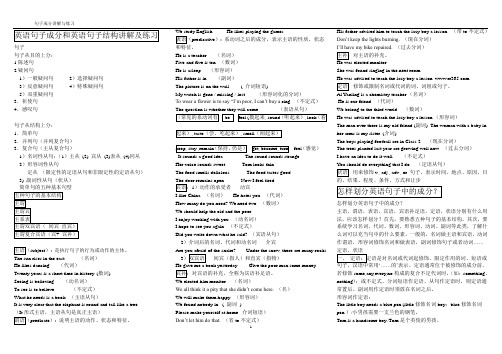
句子句子从目的上分: 1.陈述句 2疑问句1)一般疑问句 2)选择疑问句 3)反意疑问句 4)特殊疑问句 5)双重疑问句 3.祈使句 4.感叹句句子从结构上分: 1.简单句2.并列句(并列复合句) 3.复合句(主从复合句)1)名词性从句:(1)主从 (2) 宾从 (3)表从(4)同从 2)形容词性从句定从 (限定性的定语从句和非限定性的定语从句) 3) 副词性从句(状从)简单句的五种基本句型subject ): 是执行句子的行为或动作的主体。
The sun rises in the east. (名词) He likes dancing. (代词)Twenty years is a short time in history. (数词) Seeing is believing.(动名词)To see is to believe. (不定式) What he needs is a book. (主语从句)It is very clear that the elephant is round and tall like a tree. (It 形式主语,主语从句是真正主语)predicate): 说明主语的动作、状态和特征。
He likes playing the games.predicative ): 系动词之后的成分,表示主语的性质、状态和特征。
He is a teacher. (名词) Five and five is ten. (数词) He is asleep. (形容词)His father is in. (副词)The picture is on the wall. ( 介词短语)My watch is gone / missing / lost. (形容词化的分词)To wear a flower is to say “I’m poor, I can’t buy a ring. (不定式)feel (感觉)... It sounds a good idea. The sound sounds strange. Her voice sounds sweet. Tom looks thin.The food smells delicious. The food tastes good. 1)动作的承受者-----动宾I like China. (名词) He hates you. (代词) How many do you need? We need two. (数词) We should help the old and the poor. I enjoy working with you. (动名词) I hope to see you again. (不定式)Did you write down what he said? (宾语从句) 2)介词后的名词、代词和动名词-----介宾3间宾(指人)和直宾(指物)Give the poor man some money. We elected him monitor. (名词)We all think it a pity that she didn’t come here. (名) We will make them happy. (形容词) We found nobody in. ( 副词 )Please make yourself at home. 介词短语) Don’t let him do that. (省to 不定式)His father advised him to teach the lazy boy a lesson. (带to 不定式) Don’t keep the lights burning. (现在分词) (过去分词)He was elected monitor.She was found singing in the next room.Ai Yanling is a chemistry teacher.(名词) He is our friend. (代词)We belong to the third world. (数词)He was advised to teach the lazy boy a lesson.(形容词)The man over there is my old friend.(副词) The woman with a baby in her arms is my sister. (介词)The boys playing football are in Class 2. (现在分词)The trees planted last year are growing well now. (过去分词) I have an idea to do it well. (不定式)(定语从句)v., adj., adv., or 句子。
英语语法精讲:状语从句--条件,方式,地点,原因等详细+经典习题(含答案)
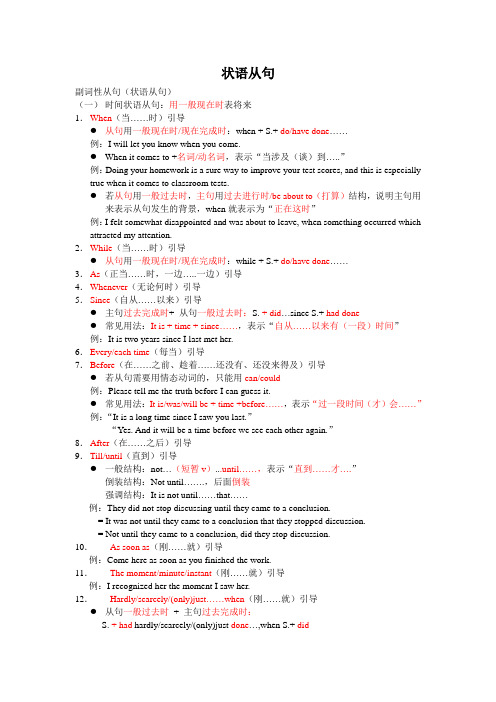
状语从句副词性从句(状语从句)(一)时间状语从句:用一般现在时表将来1.When(当……时)引导●从句用一般现在时/现在完成时:when + S.+ do/have done……例:I will let you know when you come.●When it comes to +名词/动名词,表示“当涉及(谈)到…..”例:Doing your homework is a sure way to improve your test scores, and this is especially true when it comes to classroom tests.●若从句用一般过去时,主句用过去进行时/be about to(打算)结构,说明主句用来表示从句发生的背景,when就表示为“正在这时”例:I felt somewhat disappointed and was about to leave, when something occurred which attracted my attention.2.While(当……时)引导●从句用一般现在时/现在完成时:while + S.+ do/have done……3.As(正当……时,一边…..一边)引导4.Whenever(无论何时)引导5.Since(自从……以来)引导●主句过去完成时+ 从句一般过去时:S. + did…since S.+ had done●常见用法:It is + time + since……,表示“自从……以来有(一段)时间”例:It is two years since I last met her.6.Every/each time(每当)引导7.Before(在……之前、趁着……还没有、还没来得及)引导●若从句需要用情态动词的,只能用can/could例:Please tell me the truth before I can guess it.●常见用法:It is/was/will be + time +before……,表示“过一段时间(才)会……”例:“It is a long time since I saw you last.”“Yes. And it will be a time before we see each other again.”8.After(在……之后)引导9.Till/until(直到)引导●一般结构:not…(短暂v)...until……,表示“直到……才….”倒装结构:Not until…….,后面倒装强调结构:It is not until……that……例:They did not stop discussing until they came to a conclusion.= It was not until they came to a conclusion that they stopped discussion.= Not until they came to a conclusion, did they stop discussion.10.As soon as(刚……就)引导例:Come here as soon as you finished the work.11.The moment/minute/instant(刚……就)引导例:I recognized her the moment I saw her.12.Hardly/scarcely/(only)just……when(刚……就)引导●从句一般过去时+ 主句过去完成时:S. + had hardly/scarcely/(only)just done…,when S.+ did●若hardly/scarcely/(only)just置于句首,主句须倒装(had+ S.+ done)例:He had hardly left school when it began to rain.=Hardly had he left school when it began to rain.13.No sooner……than(刚……就)引导●从句一般过去时+ 主句过去完成时:S. + had no sooner done…, than S.+ did●若no sooner置于句首,主句须倒装(had+ S.+ done)例:We had no sooner reached the top of hill than we all sat down to rest.=No sooner had we reached the top of hill than we all sat down to rest.(二)地点状语从句1.Where(在……地方)引导:从句用一般现在时例:Where there is smoke, there is fire.2.Wherever(无论在哪里)引导例:Wherever he may be, he will be welcome.(三)条件状语从句:用一般现在时表将来1.If(如果、假如)引导:用虚拟语气●if引导得从句中,若有were, had, should三词,可以省略if,并且倒装(谓语置前)例:If I had known about it, I would have told you.= Had I known about it, I would have told you.●If从句+主句= 祈使句/省略句+ and +…….例:If you give me some food, I won’t die of starvation(饥饿).= Some food and I won’t die of starvation;2.Suppose/supposing(假设)引导例:Suppose we cannot get the necessary equipment(设备), what shall we do? 3.Unless(除非、如果不)引导●Unless从句+主句= 祈使句/省略句+ or +…….例:Unless you give me another drink, I will die of thirst.= Another drink or I will die of thirst.4.As/so long as(只要)引导例:We can surely overcome these difficulties so long as we are closely united.5.If only/only if(只要)引导例:We can surely get gains, if only we work hard.6.In case/lest(万一)例:You should take good care of your kid, in case they are ill.7.Provided/Providing/Given that(假如)引导例:We will let you use the room provided that you keep it clean and tidy.8.On condition that(假如)引导(四)原因状语从句1.Because(因为)引导●表示“直接、唯一的原因”,通常放在句后,可以与not, but, only连用例:He was angry not because we were late but because we made a noise.2.As(因为)引导●表示“显而易见或大家都知道的原因”,语气较弱例:Everyone likes you as you are both kind and honest.3.Since(因为、既然)引导●表示“间接或附带的原因”,通常放在句首例:Since she insists, you must come.4.Now/seeing that(既然)引导例:Now/Seeing that you are all here, let’s try and reach a decision.5.Considering that (考虑到)引导例:Considering that he began learning English only a year ago, he speaks very well. 6.In that(由于、因为)引导例:He was late in that he didn’t catch the first bus.(五)让步状语从句1.Though/although/as(虽然)引导●Though/although…..yet连用,表示“虽然…..但是……”例:Though/although we cannot see air, (yet) it exists everyone.●as引导得从句置于句首,且倒装(表语、状语、动词置于as前)表语倒装:可以省略冠词例:Tried as I was, I stayed up late studying last night.Children as he is, he knows a lot of English.状语倒装:Fast as he read, you can’t finish novel in three days.谓语动词倒装:Try as he would, he couldn’t lift the rock.2.Even if/though(即使)引导例:Nobody lost his patience as though the meeting was long and boring. 3.However/no matter how(无论如何/怎样)引导例:We’ll continue to work, no matter how/however hot it is.4.Whatever/no matter what(无论什么)引导例:Whatever/no matter what r you may do, do your best.5.Whoever/no matter who(无论谁)引导例:Whoever/no matter who all cannot break the rules, we must keep the law. 6.Whether……or/no matter whether…..or….(不管……还是)引导例:Whether/no matter whether you can do or cannot do, you must try it. 7.Whether or not/whether……or not(不管是否……)引导例:Whether or not we had a baby, we couldn’t survive only on my salary.= Whether we had a baby or not, we couldn’t survive only my salary.(六)方式状语从句1.As(如,按照)引导例:When in Roma do as the Romans do.2.Just as(正如)引导例:Most plants need air just as they need water.3.As if/though(好像,仿佛)引导●引导的从句常用虚拟语气,除了叙述的情况实现的可能性较大例:He speaks English as if/though he were an Englishman.例:It looks as if/though the coming autumn harvest will be even better than the last one. (七)目的状语从句1.So that(以便、为了)引导●从句中谓语部分可以用can/could,may/might例:I will give you my phone number, so that you can call me when you arrive here. 2.In order to(以便、为了)引导●从句中谓语部分只能用may/might例:We should do our utmost最大可能in order that we may be able to overfulfil 超额完成the task.3.For fear that/lest(以免、以防)引导●从句用虚拟语气“should +V.”例:Batteries 电池must be kept in dry place for fear that/lest electricity should leak 渗漏away.4.In case(以免、以防)引导●从句中谓语部分不用虚拟语气例:Better take more clothes in case the weather is cold.(八)结果状语从1.that(因而)引导例:What’s the matter that they still haven’t answered our e-mail?2.so that(因而)引导●主句,+ so that,且从句中谓语部分只能用may/might例:The temperature is increased , so that the volume of the gas can become greater. 3.So…..that(如此……以至)引导●so +形容词/副词+a/an+名词+ that例:It is so hot a day that we cannot sleep.●so置于句首时,需倒装状语例:So fast did he run that I could not keep up with him●so + much/little/few/many + that,而不用such…..that例:She has so little education that she is unable to get a job.4.Such…..that(如此……以至)引导●Such +名词(可数的单数名词)+ that例:It is such a lovely day that everybody is feeling happy and gay.(九)比较状语从句1.Than(比……)引导例:There are more vocabularies in this unit than in that one.2.As……as(如……一样)引导●As +形容词/副词+a/an+名词+ as + 省略句例:He is as clever a boy as his brother.例:This book is nearly as thick as that one(is).3.Not so……as(不如……一样)引导●As +形容词/副词+a/an+名词+ as + 省略句例:You are not as tall as she.4.The+比较级,the+比较级(越……越…….)引导例:The hotter that air becomes, the lighter it gets.例题1、()______ your daughter has not come back , let me take you to the Friendship Hospital.A WhenB SinceC ThatD For2、()______ Tom is not feeling well today , he has to stay at home.A ThoughB ForC FindingD As3、()They are ______ hard-working students that they have already made ______ much progress since thay came here.A so ; soB such ; suchC so ; suchD such ; so4、()______ we have finished the book we shall start doing some exercises.A For nowB Since nowC Now thatD Since now5、()He asked us not to be noisy ______ we should wake the baby.A in cseB in the caseC in case ofD in this case巩固练习1、()______ you are familiar with the auther`s ideas , by reading all the sections as quickly as you can.A Ever sinceB As long asC So thatD Now that2、()The boy has to learn ______ things that he hardly has time for play.A so manyB such manyC so fewD such few3、()In the old days the poor worker worked long hours every day ______ he could support his whole family.A becauseB thoughC unlessD so that4、()Tell him that I will call him back , ______ he gives me a call.A in most casesB in caseC in any caseD in case of5、()______ you have reminded me , I will try to be a teacher.A Now thenB So thatC Now thatD In order that6、()You will have to study for many years ______ you may become a brain surgeon.A in order thatB in thatC althoughD soKey 1~5 BDDCA 1~6 DADBCA二、习题1、()It is almost impossible to become skilful in speaking a language ______ you use it constantly.A but forB if onlyC exceptD unless2、()Everything will be all right ______ Tom is left to do the work in his own way.A as far asB mean whileC so long asD in case3、()Do remind me of the date again tomorrow ______ I forget.A in caseB except thatC even ifD as though4、()You must do the experiment ______ the teacher told you.A asB sinceC so thatD unless5、()I could not resist having another piece of cake even ______ I was supposed to lose weight.A althoughB howeverC otherwiseD though6、()______ I suggest , he always disagree.A WhatB HowC WhateverD How a7、()However ______ you hate them , you must work with them.A very muchB too muchC much tooD much8、()Try ______ he might , Tom could not get out of the trouble.A as ifB altoughC ifD as9、()______ whales are very large , they are no longer an even match for man.A SinceB BecauseC Now thatD Although10、()Man must have food just ______ plants must have sunlight.A forB likeC becauseD as巩固练习1、()______ I know , the visitors are all satisfied with the arrangement in the next few days.A As far asB As long asC As well asD As soon as2、()______ convincing an argument is , it needs support of evidence.A No matterB ThoughC HoweverD As3、()Anyone can borrow books from the library ______ he has a library card.A so long asB sinceC even thoughD unless4、()______ much advice I gave him , he did exactly what he wanted to do.A HowB WhateverC WhatD No matter how5、()Remember , science requires your whole life ______ you had two lives to give , they would not be enough.A AlthoughB ThoughC If onlyD Even if6、()I am sure that Laura`s latest play , ______ staged , will prove a great success.A sinceB unlessC onceD until7、()Send us a message , ______ you have any difficulty.A in case thatB in caseC whileD as8、()Electricity flows through a wire ______ water flows through a pipe.A whileB just asC much asD whenever9、()Food shortage will long be a world problem ______ much has been done to supply enough for everyone.A althoughB evenC no matterD since10、()I do not like the city , ______ though I have been living here for more than ten years.A evenB asC everD butkey1~5 DCAAD 6~10 CDDDD 1~5 ACADD 6~10 CBBAA。
2022年高考英语语法精讲与精练(句子成分和基本句型)
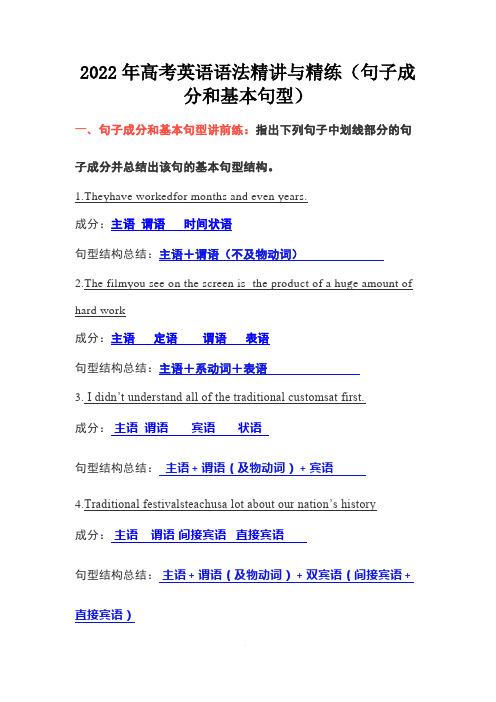
2022年高考英语语法精讲与精练(句子成分和基本句型)5.Traditional festivalsenableusto learn fine Chinese values成分:主语谓语宾语宾语补足语句型结构总结:主语+谓语+复合宾语(宾语+补语)小结:从以上的练习中可知英语中的句子成分包括:主语,谓语,宾语,表语,定语,状语,宾语补语二、句子成分和基本句型精讲(一)、句子成分:1、主语: 说明句子所谈的是:“什么人”或“什么物”,主语通常由名词、代词或相当于名词的词或短语充当。
EG:Lucy likes her new car very much. 露西喜欢她的新车。
【名词作主语】He goes to and from schoolby bike every day.他每天都起得很早。
(代词作主语)To learn English well is a challenge.学好英语是一项挑战性工作。
【不定式短语作主语】2、谓语: 说明主语“做什么”、“是什么”或“怎么样”,英语中谓语只能用动词充当。
例如:We work hard.我们努力工作。
The boy caught a bird. 那个男孩逮住一只鸟。
He is like his father. 他像他父亲。
注意:介词不能作谓语,必须与be动词连用,构成系表结构,一起作谓语。
谓语和主语在人称和数方面必须保持一致。
EG:Music is the utmost pleasure in life.音乐是人生最大的快乐。
As I take each bite, the sweet and mild flavour of the red bean filling slowly fills my mouth.3、宾语: 宾语是动作的对象。
由名词、代词或相当于名词的词或短语充当,说明主语做“什么”。
EG:Tom bought a story-book.汤姆买了一本故事书。
情态动词英语语法知识精讲
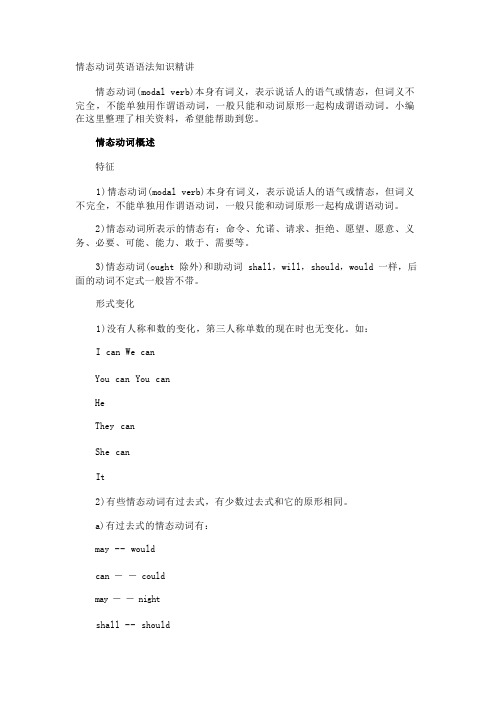
情态动词英语语法知识精讲情态动词(modal verb)本身有词义,表示说话人的语气或情态,但词义不完全,不能单独用作谓语动词,一般只能和动词原形一起构成谓语动词。
小编在这里整理了相关资料,希望能帮助到您。
特征1)情态动词(modal verb)本身有词义,表示说话人的语气或情态,但词义不完全,不能单独用作谓语动词,一般只能和动词原形一起构成谓语动词。
2)情态动词所表示的情态有:命令、允诺、请求、拒绝、愿望、愿意、义务、必要、可能、能力、敢于、需要等。
3)情态动词(ought 除外)和助动词 shall,will,should,would 一样,后面的动词不定式一般皆不带。
形式变化1)没有人称和数的变化,第三人称单数的现在时也无变化。
如:I can We canYou can You canHeThey canShe canIt2)有些情态动词有过去式,有少数过去式和它的原形相同。
a)有过去式的情态动词有:may -- wouldcan ―― couldmay ― ― nigh tshall -- shouldhave to -- had tob)过去式不变的情态动词有:must - must (或 had to)ought to - ought toneed---needdare - dare(亦可用 dared)3)大多数情态动词后面可用动词的进行式、完成式和被动形式,如:can(may,must)be doing,can(may,must) have done,can(may,must)be done 等。
否定式情态动词和助动词一样,后面可直接跟否定词not。
现将情态动词的否定式及其否定式的简略式(简略式用于口语中)列举如下:shall not--shan't [FB:nt]will not---won't [wEunt]can not-can't [kB:nt]must not-mustn't [5mQsnt]should not-- shouldn'twould not-- wouldn'tcould not-- couldn'tdare not- daren't [dZEnt]need not-- needn't在疑问句中的用法情态动词在疑问句中的用法和助动词相同。
高考英语复习 语法专题精讲精练 名词和主谓一致(含练习习题及解析)

高考英语复习语法专题精讲精练名词和主谓一致(含练习习题及解析)(一)分类(二)转换个体名词与抽象名词的相互转换物质名词与个体名词的相互转换可数名词有单数和复数的变化,而单复数的变化又分为规则变化和不规则变化两种。
名词考点聚焦名词是英语的主要词汇之一,也是历年高考的重要考点。
综合近几年高考对名词的考查,单项填空题中,每年都出现1—2道题。
此外,在阅读理解和完形填空中,名词的一词多义、熟词新意也经常涉及。
因此,在备考中一定要结合具体的语境去感悟、理解名词的辨析、名词的一词多义以及名词的习惯用法等。
①We always keep ______ spare paper, in case we ran out.A. too muchB. a number ofC. plenty ofD. a good many【解析】 答案为C 。
“paper”作为“纸”解释时为不可数名词,所以先排除B 和D 两个选项。
根据题意“我们总是准备充足的备用纸张,以防用光。
”选择答案C 。
too much 意为“太多”尽管修饰不可数名词,但用在这儿不符合题意。
②The young dancers looked so charming in their beautiful clothes that we took ___ pictures of them.A. many ofB. masses ofC. the number ofD. a large amount of【解析】答案为B。
【解析】答案为masses of 意为“大量的”既可修饰可数名词又可修饰不可数名词;the number of…意为“……的数量”;a large amount of意为“大量的”后接不可数名词;“many of”后接前面带有定冠词的名词,意为“……中的许多”。
一是考查语义方面的辨析:主要考查某些多义词在特定上下文中的引申含义,以及准确辨别一些同义、近义词在特定语境中的差异的能力。
英语语法100讲精讲

英语语法100讲精讲English Answer:Grammar is an essential aspect of language learning. It helps us understand how words and phrases are organized to create meaningful sentences. By studying grammar, we can improve our communication skills and express our thoughts more accurately. In this article, I will discuss 100 important grammar points that will help you enhance your English language proficiency.Let's start with the basics. One fundamental aspect of grammar is understanding the parts of speech. Nouns, verbs, adjectives, adverbs, pronouns, prepositions, conjunctions, and interjections are the building blocks of sentences. Each of these parts of speech has a specific role in conveying meaning. For example, nouns are used to name people, places, things, or ideas, while verbs describe actions or states of being. Understanding the functions of each part of speech is crucial for constructinggrammatically correct sentences.Moving on, let's discuss sentence structure. In English, sentences typically follow a subject-verb-object order. However, there are variations to this basic structure, such as questions, commands, and exclamations. For instance, ina question, the subject and verb are inverted, and in a command, the subject is often implied. Learning these sentence structures will enable you to communicateeffectively in different contexts.Next, let's delve into verb tenses. English has avariety of tenses, including present, past, and future.Each tense indicates the time at which an action occurs.For example, the present tense is used to describe actions happening now, while the past tense refers to actions that have already happened. By mastering verb tenses, you can accurately convey the timeline of events in your writing or speech.Another important aspect of grammar is understandingthe use of articles. Articles (a, an, the) help specifywhether a noun is general or specific. "A" and "an" are indefinite articles used before singular countable nouns, while "the" is a definite article used before both singular and plural nouns. Learning when and how to use articles correctly will make your sentences more precise and coherent.Furthermore, let's explore the concept of subject-verb agreement. In English, the subject and verb in a sentence must agree in number and person. For example, if the subject is singular, the verb must also be singular. Similarly, if the subject is plural, the verb should be plural as well. Understanding subject-verb agreement prevents grammatical errors and ensures clarity in your writing or speech.Additionally, let's discuss the use of pronouns. Pronouns are words that replace nouns to avoid repetition. They help make sentences more concise and fluent. However, it is important to use pronouns correctly and ensure agreement with the noun they replace. For example, if the noun is singular, the pronoun should also be singular.Pronouns also play a crucial role in maintaining coherence and avoiding ambiguity in writing.Moreover, let's touch upon the topic of sentence modifiers. Adjectives and adverbs are used to modify nouns and verbs, respectively. Adjectives provide moreinformation about a noun, such as its size, color, or shape. Adverbs, on the other hand, describe how an action is doneor provide more details about the verb. Using appropriate modifiers enhances the clarity and vividness of your descriptions.Furthermore, let's discuss the importance of punctuation. Punctuation marks, such as commas, periods, question marks, and exclamation points, help convey meaning and clarify the structure of sentences. For example, a comma is used to separate items in a list, while a period indicates the end of a sentence. Proper punctuation ensures that your writing is clear and easy to understand.To sum up, grammar is a crucial aspect of language learning. Understanding the parts of speech, sentencestructure, verb tenses, articles, subject-verb agreement, pronouns, modifiers, and punctuation will greatly improve your English language skills. By practicing and applying these grammar rules, you will become a more confident and proficient English speaker and writer.中文回答:语法是语言学习的重要方面。
英语语法主谓一致精讲
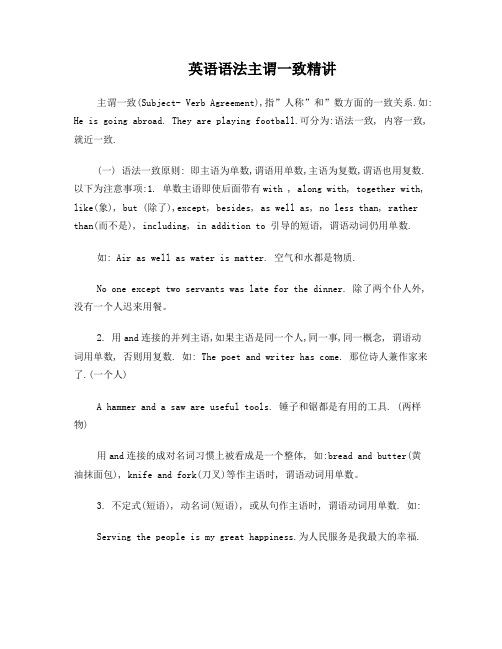
英语语法主谓一致精讲主谓一致(Subject- Verb Agreement),指”人称”和”数方面的一致关系.如: He is going abroad. They are playing football.可分为:语法一致, 内容一致, 就近一致.(一) 语法一致原则: 即主语为单数,谓语用单数,主语为复数,谓语也用复数. 以下为注意事项:1. 单数主语即使后面带有with , along with, together with, like(象), but (除了),except, besides, as well as, no less than, rather than(而不是), including, in addition to 引导的短语, 谓语动词仍用单数.如: Air as well as water is matter. 空气和水都是物质.No one except two servants was late for the dinner. 除了两个仆人外, 没有一个人迟来用餐。
2. 用and连接的并列主语,如果主语是同一个人,同一事,同一概念, 谓语动词用单数, 否则用复数. 如: The poet and writer has come. 那位诗人兼作家来了.(一个人)A hammer and a saw are useful tools. 锤子和锯都是有用的工具. (两样物)用and连接的成对名词习惯上被看成是一个整体, 如:bread and butter(黄油抹面包), knife and fork(刀叉)等作主语时, 谓语动词用单数。
3. 不定式(短语), 动名词(短语), 或从句作主语时, 谓语动词用单数. 如:Serving the people is my great happiness.为人民服务是我最大的幸福.When we’ll go out for an outing has been decided.我们什么时候出去郊游已决定了。
英语语法精讲与测试---被动语态练习(含答案)

Exercise 3Ⅰ.选择题C.1. All the machines by the end of the following week.A. will be repaired B were repairedC. will have been repairedD. would be repairedC.2. Although the mission was to be kept a secret, it to the press.A. revealsB. revealedC. was revealedD. revealB.3. Many doctors believe cures for many forms of cancer soon.A. will discoverB. will be discoveredC. they will be discoveredD. have been discoveredD.4. The new kind of machine is going to the year after next.A. turn outB. have turned outC. turning outD. be turned outA.5. The secretary opened the mail which that morning.A. had deliveredB. had been deliveredC. deliveredD. is deliveredB.6. Shortly afterwards,I noticed to my satisfaction that their work .. A. was been improved B. was being improvedC were being improved D. had being improvedA.7.A great deal of research into the possible causes of cancer in recent years.A. has been doneB. will be doneC. was doneD. is doneD.8. He told us that he to work in Italy later in the year.A. was transferredB. will transferC. will be transferredD. would be transferredB.9. The professor was profound and eloquent and with enthusiasm.A. was always listenedB. was always listened toC. always was listenedD. always listened toA.10. Those who have applied for the post in the office.A. are being interviewedB. are interviewingC. interviewingD. to be interviewingD.11. The bridge at the moment. so we had to take another way.A. had been repairedB. was repairedC. would have been repairedD. was being repairedD.12. Having received over eighty percent of the vote, Jane Byre became the first womanelected mayor of Chicago.A:who she B. she was C. was to D. to beA.13、I' ll take down your name and address in case you as a witness.A. are neededB. will be neededC. needD. were neededC.14.I should very much like to go to the party, but .A. I am invitedB. will not have been invitedC. I was not invitedD. I will not be invitedB.15. By the time tne applicant makes up his mind, the offer .A. will cancelB. will have been cancelledC. will be cancelingD. is cancelledC.16. If one by vanity, he will be very particular about other's clothing and appearance.A. overcomes B will be overcomeC. is overcomeD. has been overcomeA.17. The best use our present equipment.A. must be made ofB. must be madeC. must make ofD. must makeA.18. By signing this application,I ask that an account for me and a credit card issued as Irequest.A. be openedB. is openedC. opens D will be openedB.19.I found that my cheating in yesterday ’s English test to my parents that very evenıng.A. was reportedB. had been reportedC. had reportedD. was being reportedA.20. By promoting more even income distribution in a developing country,a lower birth ratewould .A. be achievedB. achievedC. achieveD. be achievingB.21. In the last decade, great changes in the emphasis of the bank ’s lending policies.A. have been taken place B have taken placeC. took placeD. was taken placeB.22. Besides , he had to pay back all the money ne nad reeeived from bribes.A. jailingB. being jailedC. to be jailedD. jailedB.23. There are problems with nuclea energy that have yet .A. to solveB. to be solvedC. been solvedD. being solvedA.21. Your hair wants . You ’d better have it tomorrow.A.25.I don't remember a chance to try this method.C.26. We could ask someone to do the work privately without it .B.27 He had spreaa his sails and pursuea his way, thinking that none besides those who were left alive.B.28. He looked at the room in dismay when he found it into.B.29. Officials say that few patients with the virus owing to the effective prevention.B.30. They found the lecture hard .A.31. If the work by the end of the month is delayed, the construction company will be fined.C.32. The goods when we arrived at the airport.B.33. Large sums of money each year in painting the steelwork of bridges, ships, and other exposed structures.C.34. Have you ever realized that attention your pronunciation?A.35. The riot is said by the government's negligence of the people's welfare.A. cutting ... doneB. cutting …to be doneC. being cut ... doneD. to be cut ... to be done A. having been given B. to have been given C. having given D. to have given A. know B. be known C. being known D. to be knownA. had taken upB. had been taken up —— C. took up D. were taken upA. had brokenB. had been brokenC. brokeD. was broken A. infected B. are infected C. have infected D. be infectedA. to be understoodB. to understandC. for understandingD. to have been understood A. to be completed B. will be completed C. has been completed D. being completed A. were just unloading B. had just unloaded C. were just being unloaded D. were just been unloadedA. have spentB. have to be spentC. have to spendD. have to be spending A. must be paid B. must pay to C. ought to be paid to D. should be paid A. to have been caused B. being caused C. to be caused D. to causeB.36. We want the power station as soon as possible.A. set upB. to be set upC. being set upD. to have been set upD.37. He with Prof. Smith at least four times in the past few days.A. has been seen metB. was seen to meetC. had seen meetingD. has been seen meetingB.38. The story of John implies that love from responsibility.A. cannot separateB. cannot be separatedC. cannot being separatedD. cannot be separated itselfB.39. What they have done useful to the people.A. are consideredB. is consideredC. have been consideredD. will be consideredD.40. Between 1897 and 1919 at least 29 motion pictures in which artificial beings wereportrayed __.A.had producedB.have been producedC.would have been producedD. had been produced。
昂克英文君《语法精讲》

昂克英文君《语法精讲》
昂克英文君是一位自媒体创作者,他的《语法精讲》课程主要针对英语语法进行讲解和教学。
该课程以实用为导向,旨在帮助学习者掌握英语语法的基础知识,包括名词、动词、形容词、副词等词性以及时态、语态、语气等语法结构。
昂克英文君注重结合实际语境和语言应用,通过生动的例子和实用的练习题来帮助学习者巩固所学知识。
此外,昂克英文君还提供了丰富的免费资料和练习题,帮助学习者更好地掌握英语语法。
他的教学方式通俗易懂,讲解内容深入浅出,受到了很多学习者的好评。
总之,《语法精讲》课程是一份实用的英语学习资源,适合英语初学者和有一定英语基础的学习者使用。
如果您想提高自己的英语语法水平,不妨试试这个课程。
- 1、下载文档前请自行甄别文档内容的完整性,平台不提供额外的编辑、内容补充、找答案等附加服务。
- 2、"仅部分预览"的文档,不可在线预览部分如存在完整性等问题,可反馈申请退款(可完整预览的文档不适用该条件!)。
- 3、如文档侵犯您的权益,请联系客服反馈,我们会尽快为您处理(人工客服工作时间:9:00-18:30)。
学习好资料欢迎下载大学英语语法精讲与练习1.名词前的单位词(1. 3)a piece of advice/bread/cake/chalk/work/furniture/cloth/paper/ne ws/information/evidence/luggage/luck/businessan item of news/informationa drop of oil/water/whiskeyan article of clothing/lu ggage/furniturea bar of chocolate/soap/iron/goldan ear of wheat/ricea loaf of breada lump of coal/sugar/claya slice of bread/bacon/meat/cake表示成群的单位词a flock of birds/geese/pigeons/visitors/customersa herd of bees/ants/ starsa pack of thieves/wolves/hounds(猎狗)a bunch of keys/bananas/grapes/rosesa bundle of clothes/letters/firewooda crowd of robbers2.主语与谓语的一致主语与谓语一致的原则:1 )语法一致2 )概念一致:谓语动词的单、复数形式取决于主语所表达的概念,而不取决于表面的语法标志。
The crowd were fighting for their lives.Three years in a strange land seems like a long time.3 )就近原则Here is a dictionary and a few books.Only one out of five were present.符合语法一致的几种情况( 4 )1 )当主语为单数,虽后续 with, along with, together with, aswell as, as much as, no less than, more than, like,besides, but, except, in addition to 引导的短语,谓语用单数。
An expert, together with some assistants, was sentto help in this work.Nobody but John and George was there.The teacher as well as the students was asked toattend the party.2 )主语由“a portion of, a series of, a king of etc.+ 名词”构成时,谓语用单数。
A series of pre-recorded tapes has been prepared forlanguage lab use.符合概念一致的几种情况1 )集合名词做主语时Our group are visiting the Museum next week.(我们全体成员)Our group is assigned to take the first bus.(我们小组)2 )名词词组中心词为表示度量、时间等的复数名词时,谓语动词采用单数形式Ten dollars is not enough.Fifty kilograms is not too heavy to carry.符合就近原则的几种情况1 )由并列连词or, either or, neither or, not only but also连接的两个主语 .Either you or I am late.Not only the students but also the teacher is goingto the film.2 )each and each, every and every, no and后 no续单数谓语动词。
Each book and each pen is found in its place.No teacher and no student is interested in it.3 )“ many a/more than one+ 单数名词做主语时,谓语为单数形式。
Many a student is having practice in this plant.More than one student was late for class this morning.3.形容词不具有比较意义的比较结构1) more/rather A than B: 与其说是B,不如说是AHe is rather diligent than clever. 说他聪明不如说他勤奋。
It is even more a picture than a poem. 这与其说是一首诗,到不如说是一幅画。
2) all the more因而更加:That ’ ll make the work all the more difficult.3) much more 更加,何况It ’difficults to understand his books, much more his lectures.4) much less 更不I didn’ t even see him, much less speak to him.5) none the less依然For all his years, he is none the less vigorous and active.6) other than不同于⋯,非⋯The truth is quite other than what you think.7) know better than很明白而不至于⋯Shecertainly knows better than to do it herself.8) none other than不是人而正是⋯It was none other than Miss Mary.部分同根形容的辨( 5. 5 )1) sensible可查觉得;明智的sensitive对敏感的sensational耸人听闻的He is sensible of the danger of his position.The old woman is very weak and sensitive to cold.It was a sensational news report.2) economic 有关经济的economical节俭的We should be economical in the use of our funds.The country is in a bad economic state.3) i ndustrial工业的industrious勤劳的It is an industrial country.The Chinese people are brave and industrious.4) h istoric 有历史意义的historical 有关历史的Where did the historic May 4 th Movement take place?Is it a historical novel?5) p ractical实际的,实践的practicable 可行的Now that able toyou are going to live in France, youmake practical use of your knowledge’ ll beofFrench.Is it practicable to try to grow crops in deserts?6) sociable和蔼可亲的social社会的;社交的We spent a sociable evening drinking.There are different opinions on various social questions.7) considerate 体贴的considerable 相当大的;值得重视的 /substantial Itwas considerate of you not to play piano while Iwas having a sleep.When her father died, Jane became head of a veryconsiderable business empire.8)continual略有间隙/隔的“连续不断”continuous没有间隙 / 隔的“连续不断”We’ ve had continuous hot weather for three weeks.I ’ mreally tired of your continual complaints.9)credible 可信的,可靠的credulous轻信的It ’ s hardly credible.She was so credulous that she could be easily fooled.与形容词构成固定搭配的介词( 5.8 )aboutanxious, crazy, curious, doubtful, eager, uneasyatbad, efficient, good, quick, slow, skillfulforanxious, available, insufficient, necessary, fit, grateful,ready,good,responsible,greedy,ripe,sorry, suitable, validfromabsent, distinctive, diverse, different, freeinabundant, confident, deficient, fortunate, major, rich,poorofafraid,ashamed,aware,capable,careful,certain, conscious confident,convinced,critical,doubtful, fond,full,greedy,guilty,ignorant,independent, proud,short,shy, sick,thoughtful,tired,typical, uncertain, worthy, regardlessondependent, hard, keentoaccustomed, obliged, applicable, available, benefit, convenient, dear, drink, equal, equivalent, essential, faithful, familiar, fit, grateful, harmful, helpful, identical, important , loyal, necessary , obvious,opposite, polite, preferable, proportional, relative, resistant, previous,senior,prior,sensitive,similar, superiorwithangry, comparable, consistent, content, familiar, identical, patient, pleased, popular, strict, satisfiedShe is very anxious about her husbandHe was slow at learning a language.I am very grateful for the help you have given me.All the main roads are now free of obstructions.The trees are abundant in fruits.They went camping, so as to be independent of innsand hotels.’ s health.。
